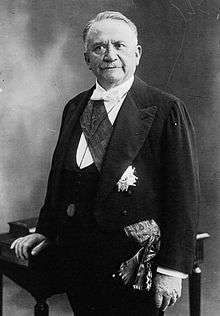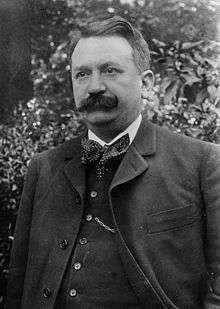Gaston Doumergue
Pierre-Paul-Henri-Gaston Doumergue (French pronunciation: [ɡastɔ̃ dumɛʁɡ]; 1 August 1863 in Aigues-Vives, Gard – 18 June 1937 in Aigues-Vives) was a French politician of the Third Republic.
Gaston Doumergue | |
|---|---|
 Doumergue in 1924, as the Grand Master of the Legion of Honour | |
| President of France | |
| In office 13 June 1924 – 13 June 1931 | |
| Prime Minister | |
| Preceded by | Alexandre Millerand |
| Succeeded by | Paul Doumer |
| Prime Minister of France | |
| In office 9 February 1934 – 8 November 1934 | |
| President | Albert François Lebrun |
| Preceded by | Édouard Daladier |
| Succeeded by | Pierre-Étienne Flandin |
| In office 9 December 1913 – 9 June 1914 | |
| President | Raymond Poincaré |
| Preceded by | Louis Barthou |
| Succeeded by | Alexandre Ribot |
| Personal details | |
| Born | Pierre-Paul-Henri-Gaston Doumergue 1 August 1863 Aigues-Vives, France |
| Died | 18 June 1937 (aged 73) Aigues-Vives, France |
| Political party | Radical Party |
| Alma mater | University of Paris |

Doumergue came from a Protestant family and was a freemason.[1][2][3] Beginning as a Radical, he turned more towards the political right in his old age. He served as President of the Council (prime minister) from 9 December 1913 to 2 June 1914. He held the portfolio for the colonies through the ministries of Viviani and Briand until the Ribot ministry of March, 1917, when he was sent to Russia to persuade the Kerensky government not to make a separate peace with Germany and Austria. He was elected the thirteenth President of France on 13 June 1924, the only Protestant to hold that office. He served until 13 June 1931, and again was Prime Minister in a conservative national unity government, following the riots of 6 February 1934. This government lasted from 6 February to 8 November 1934.
He was widely regarded as one of the most popular French Presidents, particularly after highly controversial Alexandre Millerand, who was his predecessor. Doumergue was single when elected, and became the first President of France to marry in office.[4]
According to "Rail Tales of the Unexpected" (Kenneth Westcott Jones, David St John Thomas, Nairn, 1992), Doumerge was involved in an unusual railway incident in the autumn of 1926. Travelling to Germany on the Orient Express around 1 am he accidentally opened an external door and fell from the train. His disappearance was not noticed until the train was approaching Augsburg. Eventually his whereabouts was ascertained and he was brought by car to rejoin his party. After falling out he first made contact with a signalman along the track. The signalman was reportedly unimpressed by the dishevelled elderly gentleman in night attire claiming to be the President of France. The signalman is reported to have responded with "And I'm the Emperor Napoleon!". Doumerge suffered only minor cuts and bruises.
Doumergue's First Ministry, 9 December 1913 – 9 June 1914
- Gaston Doumergue – President of the Council and Minister of Foreign Affairs
- Joseph Noulens – Minister of War
- René Renoult – Minister of the Interior
- Joseph Caillaux – Minister of Finance
- Albert Métin – Minister of Labour and Social Security Provisions
- Jean-Baptiste Bienvenu-Martin – Minister of Justice
- Ernest Monis – Minister of the Marine
- René Viviani – Minister of Public Instruction and Fine Arts
- Maurice Raynaud – Minister of Agriculture
- Albert Lebrun – Minister of Colonies
- Fernand David – Minister of Public Works
- Louis Malvy – Minister of Commerce, Industry, Posts, and Telegraphs
Changes
- 17 March 1914 – René Renoult succeeds Caillaux as Finance Minister. Louis Malvy succeeds Renoult as Minister of the Interior. Raoul Péret succeeds Malvy as Minister of Commerce, Industry, Posts, and Telegraphs.
- 20 March 1914 – Armand Gauthier de l'Aude succeeds Monis as Minister of Marine.
Doumergue's Second Ministry, 9 February – 8 November 1934

- Gaston Doumergue – President of the Council
- Louis Barthou – Minister of Foreign Affairs
- Philippe Pétain – Minister of War
- Albert Sarraut – Minister of the Interior
- Louis Germain-Martin – Minister of Finance
- Adrien Marquet – Minister of Labour
- Henri Chéron – Minister of Justice
- François Piétri – Minister of Military Marine
- William Bertrand – Minister of Merchant Marine
- Victor Denain – Minister of Air
- Aimé Berthod – Minister of National Education
- Georges Rivollet – Minister of Pensions
- Henri Queuille – Minister of Agriculture
- Pierre Laval – Minister of Colonies
- Pierre Étienne Flandin – Minister of Public Works
- Louis Marin – Minister of Public Health and Physical Education
- André Mallarmé – Minister of Posts, Telegraphs, and Telephones
- Lucien Lamoureux – Minister of Commerce and Industry
- Édouard Herriot – Minister of State
- André Tardieu – Minister of State
Changes
- 13 October 1934 – Pierre Laval succeeds Barthou (assassinated 9 October) as Minister of Foreign Affairs. Paul Marchandeau succeeds Sarraut as Minister of the Interior. Louis Rollin succeeds Laval as Minister of Colonies.
- 15 October 1934 – Henri Lémery succeeds Chéron as Minister of Justice.
See also
- Interwar France
- 6 February 1934 crisis
- List of people on the cover of Time Magazine: 1920s – 21 July 1924, 2 Aug. 1926
References
- Dictionnaire universelle de la Franc-Maçonnerie (Marc de Jode, Monique Cara and Jean-Marc Cara, ed. Larousse , 2011)
- Dictionnaire de la Franc-Maçonnerie (Daniel Ligou, Presses Universitaires de France, 2006)
- Ce que la France doit aux francs-maçons (Laurent KUPFERMAN,Emmanuel PIERRA, ed. Grund, 2012)
- Sciolino, Elaine (3 February 2008). "French Leader and Ex-Model Wed in Quiet Ceremony". New York Times. Retrieved 10 August 2008.
External links
![]()
- Gaston Doumergue at the Encyclopædia Britannica
- 1927 clip of Gaston Doumergue receiving his honorary degree from Oxford
- Newspaper clippings about Gaston Doumergue in the 20th Century Press Archives of the ZBW
| Political offices | ||
|---|---|---|
| Preceded by Albert Decrais |
Minister of Colonies 1902–1905 |
Succeeded by Étienne Clémentel |
| New office | Minister of Labour 1906 |
Succeeded by René Viviani |
| Preceded by Georges Trouillot |
Minister of Commerce and Industry 1906–1908 |
Succeeded by Jean Cruppi |
| Preceded by Aristide Briand |
Minister of Public Instruction and Fine Arts 1908–1910 |
Succeeded by Maurice Faure |
| Preceded by Louis Barthou |
Prime Minister of France 1913–1914 |
Succeeded by Alexandre Ribot |
| Preceded by Stéphen Pichon |
Minister of Foreign Affairs 1913–1914 |
Succeeded by Léon Bourgeois |
| Preceded by René Viviani |
Minister of Foreign Affairs 1914 |
Succeeded by Théophile Delcassé |
| Preceded by Maurice Raynaud |
Minister of Colonies 1914–1917 |
Succeeded by André Maginot |
| Preceded by Léon Bourgeois |
President of the Senate 1923–1924 |
Succeeded by Justin de Selves |
| Preceded by Alexandre Millerand |
President of France 1924–1931 |
Succeeded by Paul Doumer |
| Preceded by Édouard Daladier |
Prime Minister of France 1934 |
Succeeded by Pierre Étienne Flandin |
| Regnal titles | ||
| Preceded by Alexandre Millerand |
Co-Prince of Andorra 1924–1931 With Justí Guitart i Vilardebó |
Succeeded by Paul Doumer |
| Preceded by Justí Guitart i Vilardebó |
Succeeded by Justí Guitart i Vilardebó | |
| Awards and achievements | ||
| Preceded by Alexey Rykov |
Cover of Time Magazine 21 July 1924 |
Succeeded by William Sproule |